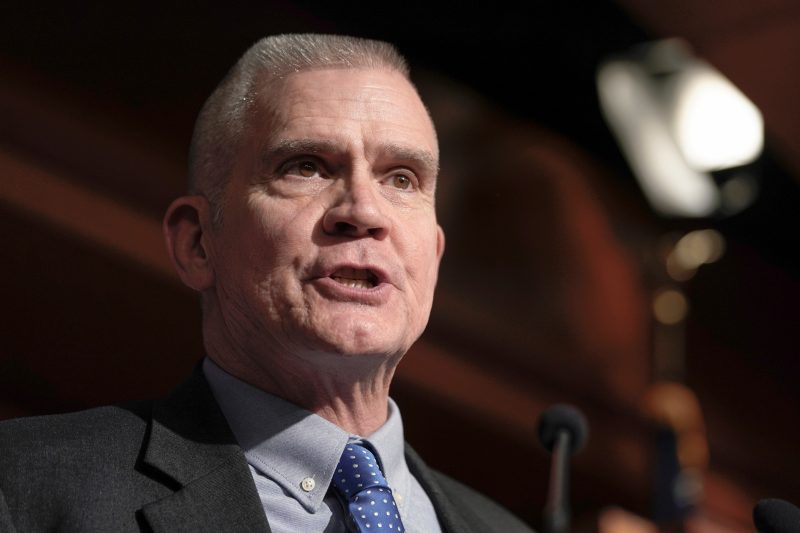‘I am leaving for the unknown.’ Palestinians fleeing Rafah describe their fear and despair
Rep. Matt Rosendale announces run for Montana U.S. Senate seat


Rep. Matt Rosendale (R-Mont.) announced a Senate run on Friday, entering a race in which several high-profile Republicans – including former president Donald Trump – are rallying behind a different candidate seeking to unseat Sen. Jon Tester (D-Mont.) in a heavily Republican state.
Rosendale’s decision sets up a competitive GOP primary, pitting the congressman against former Navy SEAL Tim Sheehy, who has secured the backing of several prominent Republicans.
“This morning, I officially filed for the U.S. Senate,” Rosendale announced on X, formerly Twitter. “We’ve made great accomplishments in the House, only to see them die at the hands of Mitch McConnell and Chuck Schumer in the Senate. Montanans want a Senator that fights for WE, THE PEOPLE, not the D.C. Cartel!”
In a campaign video released Friday afternoon, Rosendale sought to cast himself as a candidate opposed to the Washington establishment, which he described as including Senate Minority Leader Mitch McConnell (R-Ky.).
The GOP primary race “is the people of Montana versus Mitch McConnell, Joe Biden and the Washington establishment,” he said.
Rosendale was among eight House Republicans who ousted Kevin McCarthy from the House speakership last year.
Rosendale also pitched himself as the candidate in the race with the closest ties to former president Donald Trump, saying in his new campaign video that he ‘ voted in support of President Trump’s agenda every single time’ and that he “stood with President Trump and voted against the electors” on Jan. 6, 2021.
But just hours after Rosendale announced his run, Trump endorsed Sheehy in the Senate race.
“I also respect Matt Rosendale, and was very happy to Endorse him in the past – and will Endorse him again in the future should he decide to change course and run for his Congressional Seat,’ Trump wrote on Truth Social in his endorsement of Sheehy. ‘But in this instance, Tim is the candidate who is currently best-positioned to DEFEAT … Tester, and Regain the Republican Majority in the United States Senate.”
Sheehy responded to Friday’s announcement with a supercut video mocking Rosendale’s pronunciation of Montana.
“Matt, this is your 8th political run in the last 14 years and you still can’t say Montana right. It’s going to be a long 4 months….,” Sheehy wrote on X.
The Republican Senate primary is set for June 4.
Sen. Steve Daines (R-Mont.), chairman of the National Republican Senatorial Committee, is among those backing Sheehy in the race.
In a statement following Rosendale’s announcement, Daines said, “It’s unfortunate that rather than building seniority for our great state in the House, Matt is choosing to abandon his seat and create a divisive primary.”
“Tim Sheehy has my full support because he is the best candidate to take on Jon Tester,” Daines continued. “Whichever party wins the Montana Senate seat will control the United States Senate in 2024, and Republicans cannot risk nominating a candidate who gave Jon Tester the biggest victory of his career.”
In a statement, Hannah Rehm, senior communications adviser for the Montana Democratic Party, said Rosendale’s campaign announcement and the kickoff of a competitive GOP Senate primary means that “McConnell and the NRSC’s greatest nightmare in Montana came true.”
Montana Gov. Greg Gianforte and Rep. Ryan Zinke, two other leading Republicans in the state, are also supporting Sheehy.
Rosendale, who unsuccessfully ran against Tester for the Senate seat in 2018, was endorsed on Friday by Gun Owners of America, Rep. Matt Gaetz (R-Fla.) and Sen. Mike Lee (R-Utah).
While Tester, a Democrat, has served as a senator from Montana for three terms, the state leans conservative. Montana is R+11 in the 2022 statewide Cook Partisan Voter Index — a measure of how it performs at the presidential level compared to the nation as a whole. This means that in the 2016 and 2020 presidential elections, Montana performed 11 points more Republican in its two-party vote share than the entire nation.
Hayden Godfrey contributed to this report.











